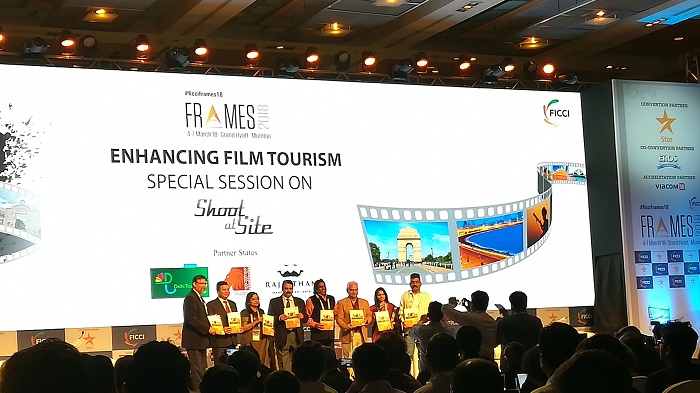The three-day global convention covering the media and entertainment industry, FICCI Frames, commenced today at Grand Hyatt in Mumbai.
Covering films, broadcast (TV and radio), print media, digital entertainment, advertisement, live entertainment, animation, visual effects, gaming, digital media and new media, the conference began with a keynote by Viacom18 group CEO Sudhanshu Vats on “Media and Entertainment: The force multiplier at the heart of society.”
From industry to governance, from consumerism to spiritualism, the media and entertainment sector defines society as we know it. Not only do we act as a force multiplier for numerous other industries, as technological advances disrupt established principles and norms, the media industry is the conduit that is facilitating this amplification of the new world order. In this constant state of flux, as new worlds are opened Vats explained how we, as an industry, prepare to increase our influence.
The first session of the day was “Enhancing Film Tourism”, a special session on shoot at site. The session was moderated by FICCI DSG Rahul Sharma, and on the panel were eminent film-maker Ramesh Sippy, ministry of tourism (GOI) regional director Neela Lad, Department of Tourism (Government of Rajasthan) additional director of development Sanjay Pande, Delhi Tourism Tpt. Dev. Corporation chief manager – PR and publicity/tourism Sudhir Sobti, Department of Tourism (Government of Gujarat) head of film facilitation, medical and wellness cell Khyati Nayak, and KriArj Entertainment film producer Prerna Arora.

“The media and entertainment industry is growing 15 to 16 per cent whereas tourism is up by 20 per cent and I’m looking forward to even better figures,” said Sippy. “The country needs more beautiful places for people to visit. Cinema is what’s madly followed in our country and people are easily intrigued by the places shown in any song or a film where it’s set. While filming Sholay, we tried to find a different location that looks similar to the ones manifested by the dacoits. So we went south and did find a place that was quite a sight for us.”
Nayak, Sobti and Pande showed videos of the various beautiful places of their respective states as well as the clips of films shot previously on those locations, urging the film-makers to explore those places through their lenses.
“There’s a natural link between cinema and tourism. So it is for us now to bring in everything else that’s necessary; hospitality, connectivity, flights, trains, buses etc. The government and tourism board in the respective place should co-operate with the same.”
“We need to simplify the process of regulation; we need to facilitate the trade. Rajasthan is the first state to have a single people window. Now all you have to do is submit an online application to the director of tourism and he can get all the approvals for you from all the concerned persons,” Pande added. “My request to this gathering would be that even after the simplification of the process, if there’s still some rule or regulation that’s causing hindrance, please bring them to our notice and we will be more than happy to drive it out immediately.”
The panelists also released the FICCI – MRSS Knowledge Report on Film Tourism: The Mega Opportunity for Destinations.
With VR and AR technologies seemingly making their presence felt at myriad sectors of industries, FICCI Frames 2018 was not an exception either. “How are Indian Entertainment Organisations Embracing AR/VR?” was this year’s attempt at FICCI where a panel from the industry tried to delve into ways of leveraging the potential of VR and AR in the M&E sector.
We are at the edge of a major revolution from consumption to immersive experiences. In the past two years, we have seen a wave of devices entering the M&E industry employing the two spectrums of immersive experiences – AR and VR. A range of major products that came to market are from companies including Oculus VR (Facebook), Sony and Google.
AR/VR is bid to change how we create and experience content and is offering a completely new creative medium. This revolution is impacting all the aspects of the media and entertainment industry from films to gaming to advertising.
Unity Technologies evangelist bizdev – film Ron Martin presented the keynote on Unity and Storytelling. He also moderated the panel which comprised of Star Sports Studio head Viraj Verma, Blippar India managing director Arnav Ghosh, VR Storytellers CEO Eddie Avil, Red Chillies VFX and Red Chillies Color chief business development officer Nishit R Shetty, MPC Advertising creative director Nishanth Shrinivasa, Vancouver Film and Media Centre (Vancouver Economic Commission with the City of Vancouver) Vancouver film commissioner David Shepheard.
The panel talked about the implications of the VR industry in the country. It pointed out that in the entertainment sector, films and sports are the ones who are at a place to leverage these technologies. Star Sports’ presentation showcased a kaleidoscope of excerpts from their sports programs which was replete with VR/AR content, making viewing experience more pleasurable and the representative from the channel that with IPL coming this year, the brand will try to improve the experience even further.
The panelists also showcased the various projects that their respective organisations have been working on. Finally, the panel concluded that India is a land of many stories and hence virtual reality can be of immense potential in bringing those stories to life by redefining reality and simulating senses.

